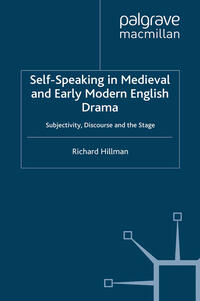
This book documents the changing representation of subjectivity in Medieval and Early Modern English drama by intertextually exploring discourses of 'self-speaking', including soliloquy. Pre-modern ideas about language are combined with recent models of subject formation, especially Lacan's, to theorize and analyze the stage 'self' as a variable linguistic construct. Both the approach itself and the conclusions it generates significantly diverge from the standard New Historicist/Cultural Materialist narrative of subjectivity. Plays range from the Corpus Christi pageants to the Beaumont and Fletcher canon, with Shakespeare a recurrent focus and Hamlet, inevitably, the pivotal text.